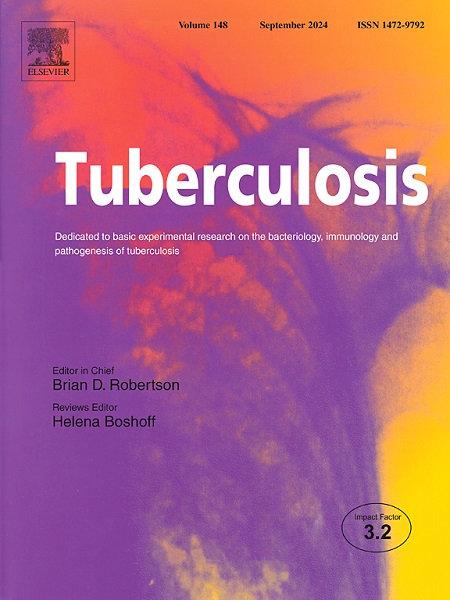Customized MHC Class I & II restricted peptides from clinical isolates of Mycobacterium tuberculosis tweak strong cellular immune response in Healthy individuals and Pulmonary Tuberculosis patients: A potential candidate in vaccine design
IF 2.9
3区 医学
Q3 IMMUNOLOGY
引用次数: 0
Abstract
Tuberculosis (TB) remains a global health challenge as annual mortality rate due to drug resistant TB is increasing exponentially. This is mostly associated with the delayed diagnosis of Multidrug-resistant (MDR) or latent TB. Effective management of TB demands development of novel immunological strategies, such as peptide-based/subunit vaccines that can stimulate specific immune responses. In this context, we evaluated the immunogenic potential of two Major Histocompatibility Complex (MHC) Class I/II-restricted peptides from Mycobacterium tuberculosis (M. tuberculosis): Rv2588c and Rv0148. The peptides were tested on T and monocyte populations from healthy donors and pulmonary TB (PTB) patients. Flow cytometry analysis revealed significant T cell activation in peripheral blood mononuclear cells (PBMC) from both groups. Enzyme-linked immunosorbent assay (ELISA) demonstrated a strong IFN-γ response, confirming effective T cell activation. Additionally, these peptides induced increased nitric oxide (NO) production in macrophages, indicating their role in activating the innate immune system. Overall, Rv2588c and Rv0148 peptides exhibited robust immunogenicity, stimulating both adaptive and innate immune responses in PBMCs from healthy and PTB individuals. These findings highlight their potential as promising TB vaccine candidates, paving the way for improved TB treatment and prevention strategies.

从结核分枝杆菌临床分离株中定制的MHC I类和II类限制性肽在健康个体和肺结核患者中改变了强烈的细胞免疫反应:疫苗设计的潜在候选物
由于耐药结核病每年造成的死亡率呈指数级增长,结核病仍然是全球卫生挑战。这主要与耐多药(MDR)或潜伏性结核病的诊断延迟有关。结核病的有效管理需要开发新的免疫策略,例如可以刺激特异性免疫反应的肽基/亚单位疫苗。在这种情况下,我们评估了结核分枝杆菌(M. tuberculosis)的两种主要组织相容性复合体(MHC) I/ ii类限制性肽的免疫原性潜力:Rv2588c和Rv0148。这些肽在健康供体和肺结核患者的T细胞和单核细胞群体中进行了测试。流式细胞术分析显示两组外周血单个核细胞(PBMC) T细胞活化显著。酶联免疫吸附试验(ELISA)显示了强烈的IFN-γ反应,证实了有效的T细胞激活。此外,这些肽诱导巨噬细胞中一氧化氮(NO)的产生增加,表明它们在激活先天免疫系统中的作用。总的来说,Rv2588c和Rv0148肽表现出强大的免疫原性,在健康和肺结核患者的pbmc中刺激适应性和先天免疫反应。这些发现突出了它们作为有希望的结核病候选疫苗的潜力,为改进结核病治疗和预防战略铺平了道路。
本文章由计算机程序翻译,如有差异,请以英文原文为准。
求助全文
约1分钟内获得全文
求助全文
来源期刊

Tuberculosis
医学-呼吸系统
CiteScore
4.60
自引率
3.10%
发文量
87
审稿时长
49 days
期刊介绍:
Tuberculosis is a speciality journal focusing on basic experimental research on tuberculosis, notably on bacteriological, immunological and pathogenesis aspects of the disease. The journal publishes original research and reviews on the host response and immunology of tuberculosis and the molecular biology, genetics and physiology of the organism, however discourages submissions with a meta-analytical focus (for example, articles based on searches of published articles in public electronic databases, especially where there is lack of evidence of the personal involvement of authors in the generation of such material). We do not publish Clinical Case-Studies.
Areas on which submissions are welcomed include:
-Clinical TrialsDiagnostics-
Antimicrobial resistance-
Immunology-
Leprosy-
Microbiology, including microbial physiology-
Molecular epidemiology-
Non-tuberculous Mycobacteria-
Pathogenesis-
Pathology-
Vaccine development.
This Journal does not accept case-reports.
The resurgence of interest in tuberculosis has accelerated the pace of relevant research and Tuberculosis has grown with it, as the only journal dedicated to experimental biomedical research in tuberculosis.
 求助内容:
求助内容: 应助结果提醒方式:
应助结果提醒方式:


